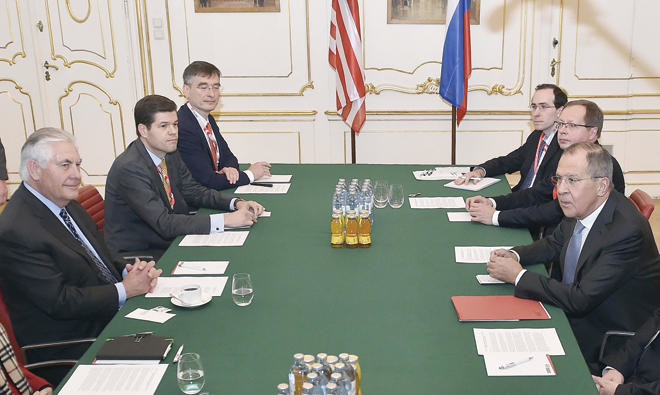VIENNA: The US warned Russia on Thursday that its ties with the West can never recover until it pulls its forces out of Ukraine, as OSCE foreign ministers met in Vienna.
Diplomats had hoped that meetings on the sidelines of the 57-nation body would make progress on agreeing terms for a UN peacekeeping force for war-torn Ukraine.
But the major powers in the dispute are still far apart, and Secretary of State Rex Tillerson went so far as to declare that the stand-off over Ukraine was the single most important obstacle to warmer US relations with Moscow.
Tillerson met Foreign Minister Sergei Lavrov behind closed doors, but when they had addressed the OSCE (Organization for Security and Co-operation in Europe) council earlier in the day, they traded allegations about interference in Ukraine and there appeared little room for compromise.
At a news conference with OSCE host Austria’s Foreign Minister Sebastian Kurz, Tillerson recalled that US President Donald Trump had been clear during his campaign last year that he wanted better relations with Russia.
“But the issue that stands in the way is Ukraine,” Tillerson stressed, after a morning ministerial meeting at which he and Lavrov had expressed starkly different views.
“We can have difference in other arenas ... but when one country invades another that is a difference that is hard to look past or to reconcile,” he warned.
“And we’ve made this clear to Russia from the very beginning: That we must address Ukraine, it stands as the single most difficult obstacle to us renormalizing relations.”
In principle, both Moscow and Washington have now expressed support for the idea of a UN peacekeeping mission to end the war between Kiev’s government forces and Russian-backed separatists in the east of the country.
But Russia envisions a limited force to simply protect the existing 600-strong group of unarmed OSCE observers, who are struggling to monitor a shaky cease-fire in a conflict that has already left 10,000 dead since 2014.
Washington, in contrast, has in mind a much more robust UN mission that would police cease-fire lines and investigate cease-fire breaches across eastern Ukraine, building the conditions for lasting peace.
“We’ve reached an absolute low point regarding confidence between the main players,” Thomas Greminger, the OSCE’s secretary general, admitted as talks began.
Western powers fear that a limited United Nations mission would serve to create a frozen conflict that would lock in Russian gains from its intervention in Ukraine.
But Lavrov, in his opening remarks to the OSCE ministerial council, argued that the bigger mission idea could become “an occupational administration” and be tantamount to attempting “to solve this problem by force.”
Tillerson did not directly address the peacekeeping issue in his remarks, but was strident in his condemnation of the threat he said Russia poses to the existing unarmed mission.
“Of all the challenges confronting the OSCE today, none is more challenging nor vexing than the situation in Ukraine,” he warned, stressing the US will never lift sanctions until Russia returns control of Crimea and the disputed Donbass region to Ukraine.
Tillerson noted that more civilians were killed this year in eastern Ukraine than in 2016, and that cease-fire violations are up 60 percent.
“We should be clear about the source of this violence. Russia is arming, leading, training and fighting alongside anti-government forces,” he said.
“We call on Russia and its proxies to end the harassment, intimidation and its attacks on the OSCE special monitoring mission,” he demanded.
And he paid tribute to an American paramedic who was killed in April when his OSCE patrol hit a land mine in a separatist-occupied area.
The OSCE was created during the Cold War to ease dialogue between East and West. But after the collapse of the Soviet Union 25 years ago it expanded and now has 57 members including the United States, Russia and Ukraine.
US warns Russia over Ukraine at OSCE meeting

-
{{#bullets}}
- {{value}} {{/bullets}}
